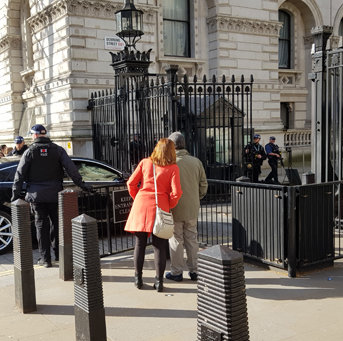Government high officials in general and Harold Wilson as prime minister in the 1960s in particular did not abide ‘leaks’. A file, Prem 13/577 at the National Archives, shows what happened when a ‘leak’ came out in a newspaper, and also gives insight into what we now know of as information security at the heart of government.
On June 23, 1965 in the London Evening Standard, the reporter Robert Carvel gave the main recommendations of the Mountbatten ‘mission’ to some Commonwealth countries about immigration to Britain, as then picked up by other, daily newspapers such as The Times. While not mentioning the mission, the newspapers did describe new, and stricter, controls on Commonwealth immigration.
By July 13, investigators from the security services (keeping MI5 director general Sir Roger Hollis informed) reported into how the newspapers learned that news. Mountbatten’s report had been typed in Karachi, and roneoed (that is, paper copies) run off in the UK’s high commission in Karachi; some 100 copies were rolled off. Thirty were put together in Karachi and the rest, with the waxes that made the copies, were brought back to London in Foreign Office red dispatch boxes, deposited at the Home Office then brought to and assembled at 10 Downing Street by a secretary. Then the waxes, and the surplus copies, were destroyed. Some 55 copies were distributed by hand by the Cabinet Office, and other copies sent to members of the mission, and government departments interested in it. Questionnaires went out to them and were answered; all held their copies still, or destroyed them when they received the later, printed, versions.
The investigators concluded that the copy from which an extract was sent to the Evening Standard was circulated by the Cabinet Office. On June 30, Carvel was asked to hand over what he had received, through the post; he refused. Carvel did reveal that the postmark on the envelope the leaked document came to him in was SW1 – which was no give-away, as that was central London’s.
It turned out that on June 15, a secretary asked a messenger to collect classified waste – the surplus copies of the report. Two sacks were locked in a steel cupboard, and taken to the teleprinter room by a woman who locked the door. The sacks remained there, until they were taken away by waste disposal, on June 17. The secretary had been at fault, in giving the waste to a 10 Downing Street messenger. ‘However,’ the investigators reported, ‘the messenger concerned is one of our most reliable men and is very conscious of the importance of security.’ Clearly the case was deemed important enough to reach the prime minister, who initialled the report in green ink and asked that Mr Carvel be handled ‘gently’.
The messenger gave a statement. At about 5.15pm on June 15, that is, around the end of the office’s working day, the secretary rang him to ask him ‘to bring up a sack to collect some secret waste which I did straight away. I filled two sacks and I took them straight downstairs’ There he asked one of the ‘girls’, ‘if she would be kind enough to lock them up in the steel cupboard and they were locked away …. in my presence’. Five pages, the investigators learned, had become detached when removed from ‘one of the special racks’ where papers were kept.
Also on file was a 10 Downing Street press officer, Henry James, who on June 24 recorded that he met Carvel – a ‘lobby’ journalist covering politics – at Marlborough House the evening before. Carvel said he didn’t know who had sent the material. In the morning Carvel had telephoned James, to check what he had received was an official Government document, having received it in the post (‘a cheap manilla envelope with his name and office address in pencil’, and a two and a half pence stamp) that morning. James could not confirm or deny it; and said that Carvel should return it to the Government. Carvel said he would have to discuss it with his editor. At 1230, Carvel rang James again, to say that by 2pm the Standard article would be on the streets. James warned of a breach of copyright. In fact the Evening Standard only gave a summary of what the mission was putting in front of the Government, so that Government could make policy decisions.
The file remarked correctly that Carvel was ‘fairly cooperative’ towards the officials trying to find the culprit who leaked, ‘but not helpful’.









